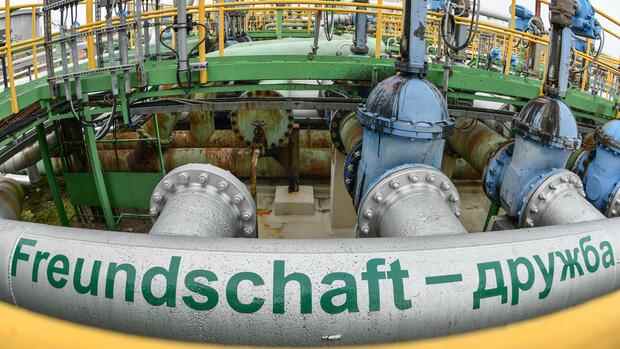Brussels, Berlin The first demonstrators were already gathering at the barriers in Brussels on Monday morning. They carry blue and yellow Ukrainian flags and fill the square in front of the EU Council building with sound, where the heads of state and government will later meet for their special summit. “You keep making new promises that the oil embargo is coming!” shouts a woman with a megaphone. “Where is the oil embargo?”
First you have to ensure Hungary’s energy security, then you can talk about sanctions. He accused the EU Commission of “irresponsible behavior”. In the best-case scenario, a so-called “political agreement”, a vague declaration of intent, is expected at the summit.
However, the details of the embargo will probably continue to be disputed for days. “My expectations are low that it will be resolved in the next 48 hours,” said EU Commission President Ursula von der Leyen before the start of the summit. Chancellor Olaf Scholz, on the other hand, identified a “will to understanding”.
Top jobs of the day
Find the best jobs now and
be notified by email.
In the search for a compromise, the sixth package of sanctions against Russia has already been severely watered down. The latest draft would temporarily exempt all oil coming through the Druzhba pipeline from the boycott. This means that Hungary, the Czech Republic and Slovakia could continue to import Russian oil – but so could Germany and Poland. How long this exception should apply was not specified in the draft of the summit declaration.
Two thirds of all Russian oil imports come to Europe by sea. Stopping these deliveries is “a remarkable achievement for the EU,” said an EU diplomat. But the exception for pipeline oil also means that a third of all imports can continue to flow unhindered to Europe.
Advantage for Germany pushes other governments
It is therefore only a partial embargo. The originally planned ban on European shipping companies transporting Russian oil was overturned after violent protests, including from Greece. This makes it easier for Russia to find new buyers.
The derogation for pipeline oil sparked a dispute even before the summit at the preparatory meeting of the 27 EU ambassadors. In particular, the fact that economically strong Germany should now be able to continue importing cheaper oil from Russia repelled other governments. Italy, Belgium and the Netherlands, among others, warned of possible distortions of competition.
Germany and Poland rejected the allegation. Both have again put on record that they will no longer import Russian oil from the end of the year, as planned, said an EU diplomat. This eliminates any supposed competitive advantage, because the sea route embargo is not to come into force until the end of the year. Scholz said Germany had done everything it could to become independent of Russian oil by the end of the year. He also defended the pipeline oil exemption.
>> Also read here: Fears of supply bottlenecks push oil prices to their highest level in two months
However, experts express doubts about the usefulness of the compromise proposal. The economist Axel Ockenfels said: “Perhaps the compromise under discussion does not signal Vladimir Putin’s strength, but on the contrary European disunity and vulnerabilities.” “
The situation at the Schwedt refinery is still unclear
The German roadmap to independence from Russia is also difficult in practice. Twelve percent of German oil imports still come from there. Almost all of it ends up in the PCK refinery in Schwedt, Brandenburg. At the end of April, Economics Minister Robert Habeck (Greens) said he expected complete independence from Russian oil within days. It has now become more than a month.
The refinery in Schwedt is supplied almost exclusively via the Druzhba oil pipeline. Habeck is working on organizing alternative delivery routes via Rostock and Gdansk in Poland. The problem: the majority owner of the refinery is the German subsidiary of the Russian state-owned company Rosneft. And Poland is not ready to release its infrastructure for a Russian company.
The EU is discussing a new proposal: Only tanker oil, not that flowing through the pipelines, could be sanctioned.
(Photo: dpa)
“It pays for itself that, despite the Crimean War, a Russian energy company has had such a strong influence on the supply situation in recent years,” said Michael Kellner, Parliamentary State Secretary in the Ministry of Economic Affairs.
>> Also read here: Machine builders lower forecast again – and plead for an oil embargo
According to a Greenpeace study, deliveries from Rostock alone would only be enough for a 60 percent capacity utilization of the PCK refinery. Local concerns are immense. Annekathrin Hoppe (SPD), Mayor of Schwedt, explained that it was impossible to operate the refinery at only 60 percent for the transition. “It can’t work. It would inevitably come to a standstill,” she told Handelsblatt.
Voices are growing that Germany should make use of the exception for pipeline oil. “If the federal government cares about the region and the secure supply, 2030 would be a reasonable target,” said Hoppe.
So far, however, the federal government has not seen this as an option. Instead, the Economy Ministry is preparing solutions to force Rosneft out of PCK. But even then, the supply of the refinery is not immediately secured without Russian oil. “There is great mistrust of the federal government,” said Hoppe.
State Secretary Kellner replied that for Schwedt the rapid exit from Russian oil was “also an opportunity to position oneself for the future”. But things are “remaining complex”.
More: Summit of the helpless – Europe’s unity is crumbling
